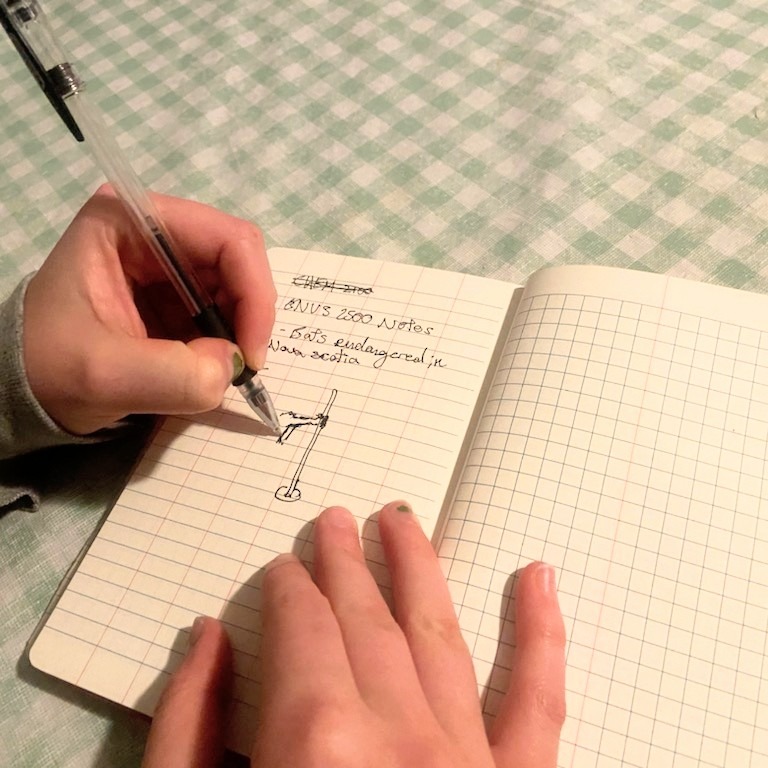
Dalhousie quietly cuts note taker program without telling students
Some professors are now paying students out of their own pockets
Dalhousie University quietly removed its note-taker program without alerting its students.
The program, which was run through the Dalhousie accessibility office, paid student volunteers $75 per course to share class notes with students who have accessibility accommodations. It’s unclear how many students received the accommodation.
Students were not sent an email about the program’s elimination, and some professors say they were not alerted either.
Melanie Frappier is the director of the history of science and technology program at the University of King’s College. She only discovered the program was cut when she tried to get accommodations for her son, a new Dalhousie student.
“It wasn’t announced to faculty, nothing was distributed. Maybe because of the lockout, information got lost,” she says.
In place of the note taker accommodation, the university is asking professors to record their lectures. Lecture recording was an accommodation that existed before the removal of the note taker program.
Frappier says that recordings are not a substitute for class notes.
“Students need notes not because they’re missing class, but because they often have things like ADHD — it’s a problem of attention. If we give them recordings, they just spend hours listening to the same material to try and analyze it.
“This is not taking away a barrier. It’s just adding a barrier.”
Flawed program
Ellie Anderson is president of the King’s Student Union. King’s accessibility supports are run through the Dalhousie accessibility office.
Before the program was cancelled, Anderson used the notetaker accommodation.
She admits the program was flawed, but says Dalhousie should have asked students for feedback and looked to reevaluate the program before closing it entirely.
“Not every class could find note takers, and students complained that some notes were incomplete, handwritten, hard to follow, or just copied already available slideshows word-for-word,” she says.
The accessibility office coordinator told both Anderson and Dalhousie Gazette reporters that the program was cancelled following complaints from students, not due to budgetary reasons.
Dalhousie Accessibility didn’t respond to repeated requests for comment before publication.
Quenta Adams is Dalhousie’s assistant vice provost of student engagement and success. She says that peer note taking is an “unsuccessful model.”
“From timeliness to quality control, this particular response has caused a gap and a resulting disservice to our students. As such, we are focusing on responses that address the timeliness and quality of this accommodation requirement.”
To receive accommodations, Dalhousie students must submit documentation from a medical professional. Nova Scotia has the highest disability rate in Canada, with nearly 38 per cent of residents having a disability according to 2022 Statistics Canada figures.
Maren Mealey is the president of the Dalhousie Student Union. She says that the university is treating accessibility as an afterthought.
“While we acknowledge that the notetaker program has long faced significant flaws, its sudden removal, without notice or communication to students, demonstrates a lack of respect and consideration for those who rely on it,” Mealey says.
Just use ChatGPT
When Anderson went into Dal’s accessibility office to ask about the program’s cancellation, the office administrator suggested that Anderson ask ChatGPT to write notes based on lecture recordings.
“When I have a long email that I don’t want to read, I put it through ChatGPT or Copilot and ask it to summarize it; you should do the same with your lectures,” Anderson says the administrator told her.
Anderson did not appreciate the suggestion, particularly because of the shortened school semester.
“Getting rid of 21 per cent of the semester and then asking us to use AI is ridiculous,” Anderson says. “Their decision-making is actively taking away the ability of students to access an education.”
Frappier backed up Anderson’s claim.
“The original answer we got from some of the officers at the accessibility centre was ‘It’s easy, just record the seminar — which is not easy — and put it in ChatGPT and ask it to provide notes,” she says.
Frappier says taking lecture recordings is extra work for professors.
“We have to take time to set up recording equipment,” she says. “And if students are uncomfortable being recorded, we need to edit the recordings before they are uploaded to preserve their right to privacy. That’s taking up our free time as well.”
Professors adapting
Todd McCallum, a history professor at Dalhousie, took matters into his own hands. In each of his classes, he pulled out two $50 bills and said he’d pay two student volunteers to take notes.
“I learned about this policy change only after the lockout had ended, so I had little time to devise a different solution,” McCallum said.
McCallum said electronically generated transcripts are a “poor substitute” for student notes.
“I teach about many ugly subjects; this term, one of my courses focuses on conspiracies and conspiracy theories,” he said. “Unfortunately, transcripts don’t capture the tone of speech, making it difficult to tell if a person is just describing a conspiracy theory or advocating for or against it.”
Frappier’s solution is asking her teaching assistant to spend billable hours taking notes.
“This means I’ve lost around 12 hours of TA support,” she says. “So I have to grade all the final projects on my own at the end of the term.
Anderson vowed to bring a note-taker program to King’s if Dal doesn’t bring back the program.
“We will create our own system with a platform where note-takers can upload their notes,” she says.






